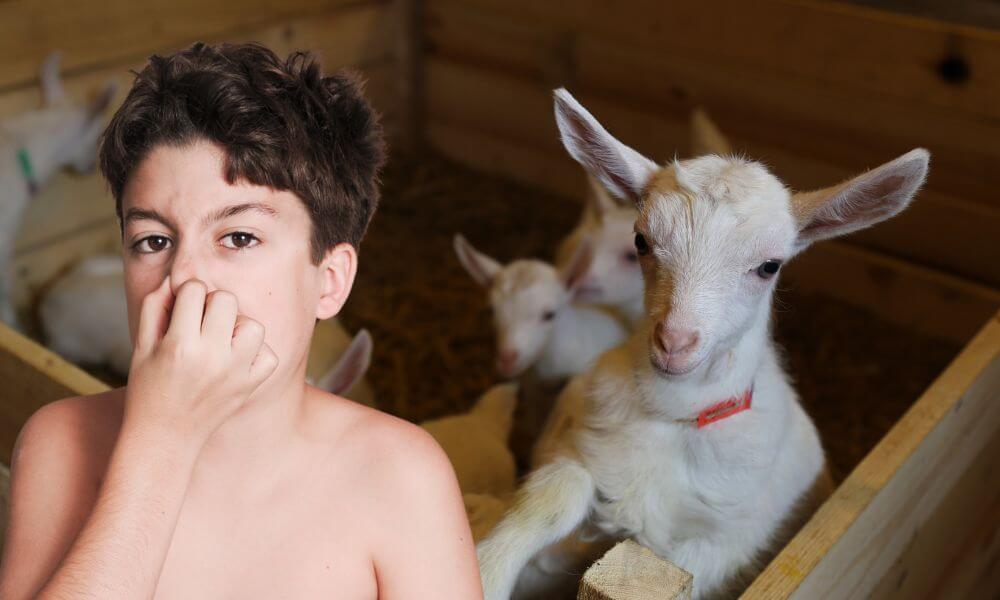Goats are definitely not too prim and proper to pass gas, but we can’t really blame them for that.
If you have four stomach compartments and had to rechew all your food, you’d be happy to just let off some steam (or rather gas).
And this gas isn’t only stinky; most of a goat’s fart contains methane gas, a valuable natural gas that can be used for many purposes.

What makes a goat fart?
Because farts are a byproduct of the digestion process, they come out of the back.
Before we can understand why goat farts happen, we need to understand how their digestion process works.
Goats are part of a class of animals called ruminants.
Ruminants like cows and deer have four stomach compartments that are specially designed to digest hay, grass, and forages that are high in fiber.
These foods are known as roughage and are difficult for other mammals to digest because they don’t have the required bacteria in their gut.
One special feature of ruminants is “chewing the cud”.
This is a process where a ruminant will eat and swallow food, but then bring it up again later to chew it further for maximum absorption in their stomach.
A goat’s digestive process follows the following areas:
Mouth
This is of course the food’s first entry point.
The goat uses 32 teeth similar to ours to break off and chew the food.
Food will return here later from the reticulum to be rechewed.
Reticulum
The first stomach compartment and entry point of a goat’s digestion system.
Microorganisms and bacteria that can digest fiber from grass and hay are found here.
Rumen
Together with the reticulum, this second compartment forms a large fermentation vat to break food down further.
Breakdown products will already be absorbed through the rumen walls to provide much of the goat’s energy.
Omasum
All the byproducts and leftover food travel to the omasum where especially large food particles are trapped and digested.
Some water is reabsorbed here to keep the digestive material from drying up.
Abomasum
The now-digested food particles move to the final stomach compartment to undergo acidic digestion, breaking down every last particle of food in readiness for the intestines.
Small intestine
Well-broken-down food moves to the small intestine where enzymatic digestion and nutrient absorption take place.
Large intestine
As in humans, the large intestine absorbs the final amounts of water and salts from the digestive material and then passes it on to be excreted.
Now we finally get to the fart part.
Because the goat’s large stomach can hold up to 5 gallons (19 liters) of digestive material and there are four different stages of digestion, a lot of excess gas is created.
Most of this gas is methane created as a byproduct of digestion by the special bacteria that makes it possible for a goat to digest fiber.
That’s why the poop from other larger ruminants such as cows is often used to generate methane.
Some people are concerned over cows’, goats’, and other ruminants’ emissions, even though these gases are natural and not destructive to the environment like human sources.
This methane gas (with other gas byproducts) needs to be released so that it doesn’t cause the goat’s stomach to swell and hinder the digestive process.
Some of the gas is passed out the back, making goats fart.
Does a goat’s fart stink?
Yes, it does.
Methane is not the culprit in this case, even though it makes up most of the goats’ farts.
It is odorless and colorless, but it mixes well with other gases in the gut to form hydrogen sulfide, which stinks a lot.
Some ammonia is also produced, adding to the stinky smell.
Their farts are so potent that they forced a plane transporting 2,000 goats to make an emergency landing in 2015.
The fire alarm was set off during the flight because the goats were producing a lot of gas.
What does a goat’s fart sound like?
A goat’s fart usually sounds like a human’s fart.
This does depend on some factors like the goat’s size and the pressure involved, but if you imagine the typical short, high-pitched fart sound you’re used to hearing when grandpa is relaxing on the couch, then you’ll recognize a goat’s fart too.
Do goats burp?
Yes, goats burp too.
They actually burp more than they fart, because most gases are produced in the rumen, the second stomach compartment.
Goats may even burp and fart at the same time.
When digestion is happening, which is most of the time if you’re a goat, a burp comes out up to once a minute.
These burps don’t smell as much as farts do (because it hasn’t passed through the entire digestive process) but still smell a little unpleasant if you get too close.
Goats are also not known for brushing their teeth regularly, so don’t be surprised if you smell a stinky breath up close.
Goats will prefer to burp rather than farting since it’s the quickest and easiest way out for trapped gases.
If you realize your goat is not burping and farting, it’s not a sign that it has decided to change its ways.
This is a sign of a deeper issue that should be resolved quickly.
While we may see burping and farting as unpleasant rudeness, goats have a good reason for doing so.
If goats don’t burp and fart often, they will become bloated, a lethal condition for all goats.
The more it smells, the better it usually is.
Be sure to keep your goats in a well-aired enclosure where they can get plenty of fresh air to carry the smelly farts and burps away.
